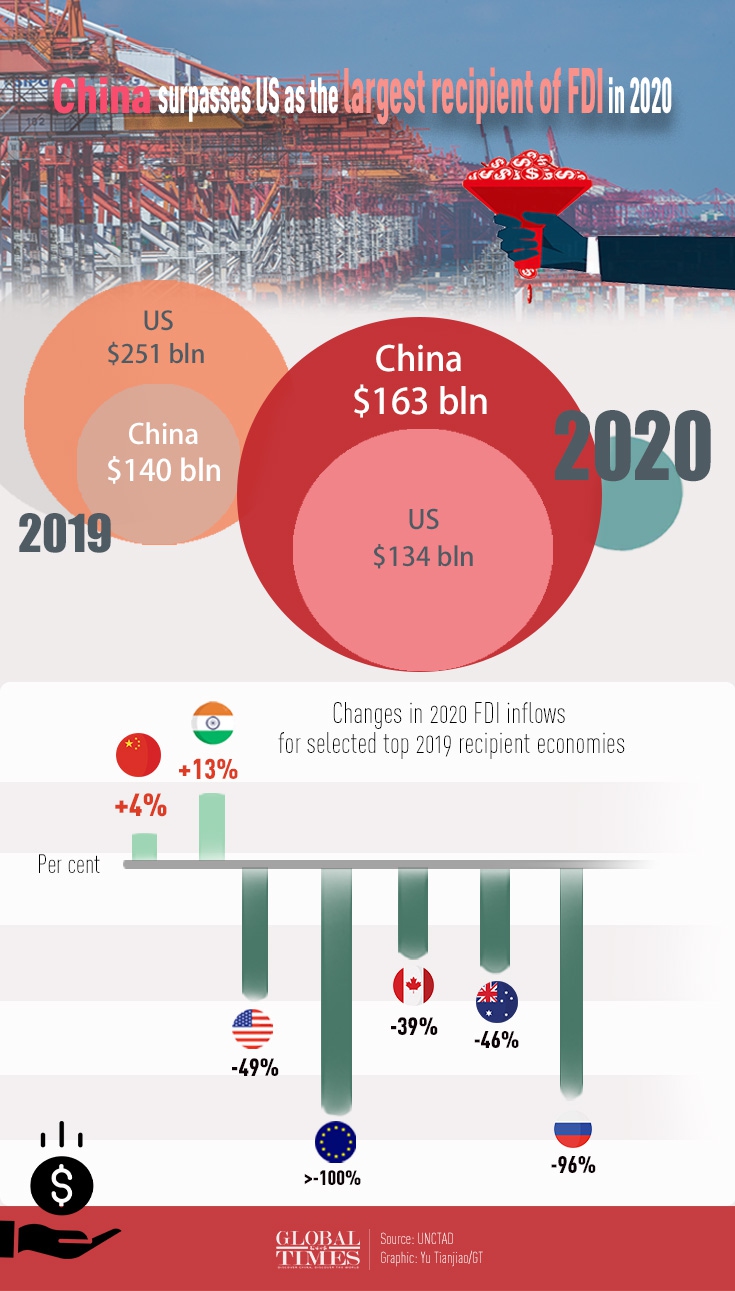
Core construction work on a 300-meter-long conservatory, part of the Raffles City Chongqing complex, is complete in Southwest China's Chongqing, Jan. 14, 2019. Located at the confluence of the Yangtze and Jialing rivers, Raffles City Chongqing has been designed by world-renown architect Moshe Safdie, who drew inspiration from the region's thousand years of waterway transportation history. The conservatory, 32.5 meters wide and 26.5 meters tall, connects the tops of four buildings, 250 meters above the ground, as well as accommodating a viewing deck, an infinity pool, a sky walk and varied dining options. (Photo provided to China News Service)
Newly released trade and GDP data for 2020 shows the stellar performance of China's economy despite the COVID-19 outbreak. The world's second-largest economy also attracted the largest amount of foreign direct investment (FDI) last year.
China was ranked No.1 with FDI of $163 billion in 2020, according to the UN's latest report on global investment, eclipsing the US, which attracted $134 billion.
Global FDI plunged 42 percent to an estimated $859 billion last year amid the pandemic, and it was more than 30 percent below the trough seen after the global financial crisis in 2009, a report by the UN Conference on Trade and Development (UNCTAD) said on Sunday.
China bucked the trend, with an increase of 4 percent from 2019, making it the world's largest recipient. In 2019, the US received $251 billion in FDI inflows and China received $140 billion.

China surpasses US as the largest recipient of FDI in 2020. Graphic: Yu Tianjiao/GT
"FDI in China, where the early phase of the pandemic caused a steep drop in capital expenditures, ended the year with a small increase," said the report.
Major foreign-invested projects in many areas of China were breaking ground near the end of last year. Global research and development centers, headquarters projects, and supply-chain operation centers have become the first choice of foreign investors, who have been attracted by the significant potential of China's market and the resilience of its economy, the only major economy to grow last year.
Gao Lingyun, an expert from the Chinese Academy of Social Sciences in Beijing, said that "it's really a hard-won achievement, not only growing but also exceeding the US."
Despite the rising anti-globalization sentiment, with some Western governments calling on their enterprises to move their industry chains out of China, the market-oriented players voted with their feet, Gao noted.
Wang Xiaohong, deputy director of the Information Department, China Center for International Economic Exchanges, told the Global Times on Monday that China's advantage in stabilizing the supply chains, its huge market and improving business environment played key roles in foreign investors' decisions.
"Emerging first from the COVID-19 disruptions, China offers overseas investors a sense of safety, like a safe haven against the dismal world," said Wang, adding that the signing of the Regional Comprehensive Economic Partnership (RCEP) among the world's largest trade bloc also enhanced expectations for freer trade.
Scott Zhang, president of Honeywell China, told the Global Times that after experiencing the pandemic's scourge, the energy and business opportunities brought about by the integration of the physical world and the digital world are immeasurable, especially in the Chinese market.
The US industrial conglomerate was the first Fortune 500 company that invested in Wuhan, the Chinese city that was hardest hit by COVID-19, after its lockdown was lifted on April 8, 2020 by opening its emerging market headquarters and innovation center in the city.
Suez, a global leader in water and waste management services, increased its investment in China last week by purchasing 694 million euros ($845 million) worth of equity stakes in its Chinese ventures.
"Suez wants to be a significant player - maybe not the biggest, but an important player to help Chinese achieve their [ambitious carbon neutral] target," Steve Clark, CEO of Suez Asia, told the Global Times on Monday.
"I actually can see in 10 or maybe 15 years' time, China becoming No.1 in the world in terms of its environmental projects and programs." he said.
China's FDI jumped 6.2 percent year-on-year to reach a record high of 999.98 billion yuan ($144.37 billion) last year, the record high since 1983, the Ministry of Commerce said last week.
Experts said that China would further open up this year to attract more foreign investors, reinforcing its position as the top destination for FDI.
The global FDI slump, as the UN report showed, was concentrated in developed countries, where FDI inflows fell 69 percent to an estimated $229 billion, the lowest level in 25 years.
Inflows to Europe fell $4 billion. Among EU members, 17 saw their FDI decline, with Germany posting a large decrease despite a jump in cross-border merger and acquisition deals, while the UK had no new inflows last year.
With the conclusion of negotiations on China-EU comprehensive investment treaty, it is expected that more Chinese companies, encouraged by the favorable external conditions, would invest in Europe. For the EU, FDI from China is something it highly values to spur the economies, according to Wang.
The FDI decline in all developing economies was measured at 12 percent to end at estimated $616 billion, the report showed. The share of developing economies as it relates to global FDI reached 72 percent, the highest on record. It is noticeable that India saw a 13-percent rise in its FDI.
Further slow growth is expected for global FDI in 2021, putting at risk a sustainable recovery, according to the UN report.





